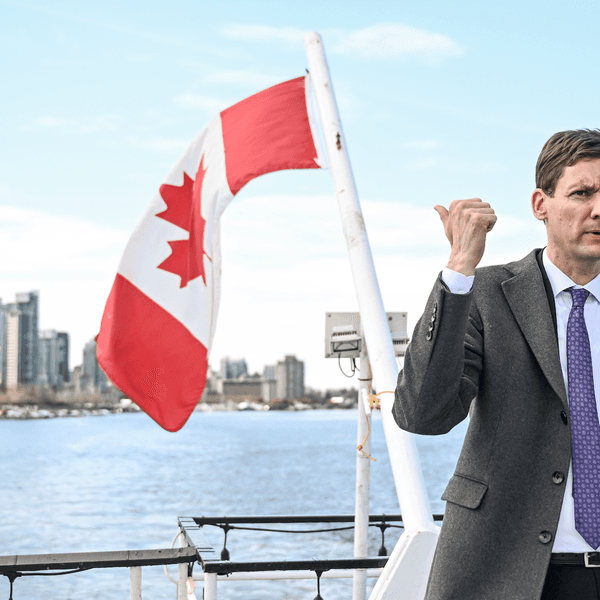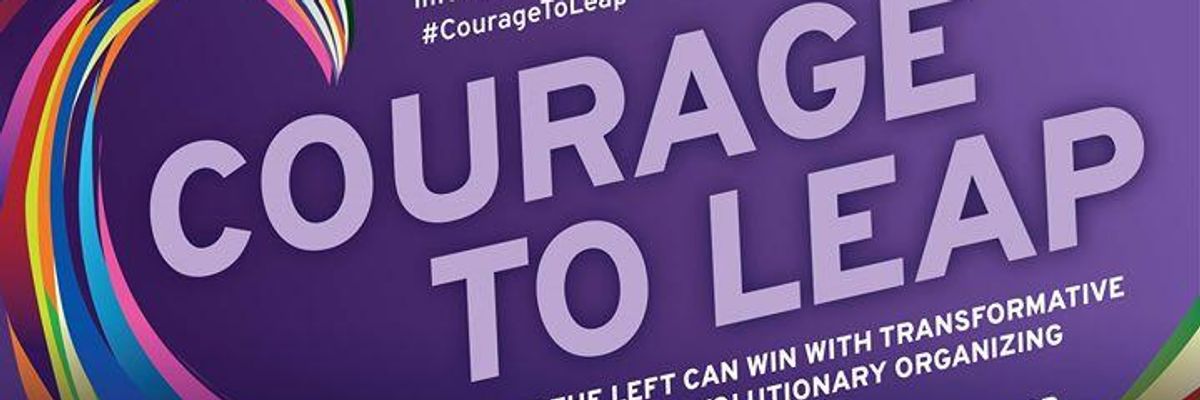A revolution is coming to Ottawa in two weeks.
For the past two years, the Leap Manifesto has been a disruptive force within New Democratic Party politics. Now, on the eve of the federal NDP convention this month, top organizers for U.S. Democratic Sen. Bernie Sanders and British Labour Leader Jeremy Corbyn are coming to town to lend the Leap movement support.
"Courage to Leap" is the title of the Feb. 15 event, and the marquee speakers are disrupters themselves from the nations of Donald Trump and Brexit. Among them: Becky Bond, a senior adviser to Sanders and co-author of Rules for Revolutionaries; Emma Rees and Adam Klug from the Momentum U.K. movement; and Marsha De Cordova, a Labour MP and Corbyn's shadow minister for disabled people.
Bond, who has been carrying a battered old copy of the Leap Manifesto around in her pocket as she organizes across the United States, says there is a natural alliance between Sanders supporters and the people who have lined up behind Leap in Canada and Corbyn in Britain.
"It's not just a movement in the United States," Bond said in an interview with the Star. "It's a movement that includes people from Canada and the U.K. and other countries. I'm going there (to Ottawa) for connections. I'm there to learn what I need to learn so that next time we don't fall short and that we win."
In the U.K. this week, Klug and Rees of Momentum -- a "grassroots campaigning network" that arose out of Corbyn's leadership campaign -- were getting ready to make their first trip to Canada.
"It really was about a movement of people that are really ready for big change and being able to tap into all of those people and work together to make the change, whether the politicians have it on the agenda or not." --Becky Bond, advisor to Sanders' presidential campaign"There's so many similar themes and parallels, both in terms of the kind of society we want to achieve and in what we're trying to build," Klug said.
Corbyn's showing in last year's snap British elections -- 40 per cent of the popular vote -- is proof that a populist-left manifesto can translate into electoral success for parties willing to take the risk, says Rees.
"In the space of just over six weeks Labour made an absolutely historic comeback," Rees said. "The manifesto was incredibly popular ... it really disproved that conventional wisdom, that you can't put forward a bold, transformative manifesto."
The "Courage to Leap" event, to be held at the Museum of Nature, is not formally on the schedule of the NDP convention that gets under way in Ottawa on Feb. 16, but its organizers intend it to be a scene setter, and a provocative one at that. The event's title is an amalgam of its two hosts: the Leap movement, and the "Courage" organization, which calls itself a coalition of the independent left "trying to bridge the divide between movement and electoral politics."
Much has changed since Leap was last shaking things up in the NDP -- the party has a new leader, Singh, who took over last fall. As well, Trump has become president of the United States and Britain has voted to get out of the European Union. These latter two developments -- a surge of populism on the right -- are being seen as an even stronger argument for a progressive populism of the left.
Moreover, says Avi Lewis, Canada has now seen two full years of government under Prime Minister Justin Trudeau -- two years that have seen the unravelling of some of his progressive promises, whether on electoral reform or protecting the environment. So for all these reasons, neither he nor Klein are expecting to get the same kind of backlash they received in Edmonton.
"It is a different moment," says Lewis. "I think the ground has shifted dramatically in the country."
The Leap Manifesto is a declaration, fewer than 1,500 words in total, calling for some sweeping policies to deal with global problems such as climate change, and income inequality. Among the recommendations are an end to all pipelines and international trade deals, as well as calls for national child care program and studies into a basic, guaranteed income.
It first landed in the midst of the 2015 election campaign, right around the time that NDP leader Thomas Mulcair's fortunes were beginning to slide in the polls -- going from the likely next prime minister in August, to third-place finisher in October that year. Many of the more centrist or pragmatic folks in the NDP accused Leap of undermining the party's chance at power, scaring off Canadians who feared the "radical left."
Leap returned to the NDP convention in Edmonton in April 2016, where Mulcair was toppled in a leadership review. The movement, and its champions, had a similarly rough ride in Edmonton -- Alberta Premier Rachel Notley made it abundantly clear that its ideas weren't welcome.
"Those ideas will never form any part of our policy. They are naive, they are ill-informed and they are tone-deaf," said Notley, who saw Leap as undoing all the work she had done to make the party acceptable to the all-important resource sector of Alberta.
Still, a majority of NDP members voted in Edmonton to study the policies in the Leap Manifesto, and in an EKOS poll a few months later -- one that Lewis is fond of quoting -- a full 40 per cent of respondents said they could get behind the ideas in the declaration.
It's that "ideas" thing that Bond has been emphasizing when she is out organizing in the United States. The people who united behind Bernie Sanders were there for what he was saying -- the radical shakeup he was proposing, Bond said.
"It really wasn't about Bernie," she says. "It really was about a movement of people that are really ready for big change and being able to tap into all of those people and work together to make the change, whether the politicians have it on the agenda or not."
The ideas linking Leap, Momentum and the Sanders campaign are large ones: fighting climate change, the power of banks and corporations and income inequality. They are all focused too on mobilizing volunteers with real tasks and duties -- Bond has written extensively about how political organization leans too much on staff and too little on volunteers.
She carries the Leap Manifesto around with her as a tool of persuasion -- to show Americans that the ideas transcend national boundaries. It was Klein herself who gave the paper to Bond, when they met up not long after the U.S. election. Bond was still coming to grips with a momentous time in U.S. politics. While Trump had won and Democrats had lost, the Sanders campaign had galvanized a lot of people. Trump in the White House is serving as a daily reminder of the need for a progressive populism.
"When I was handed the Leap Manifesto I saw that this was also happening in Canada . . . a movement of people organizing themselves, not behind a politician, but behind a set of ideas that we could fight for," said Bond.
Rees and Klug make the same point about Corbyn; that policies, not personalities, are what build populist movements. Yet personality and celebrity seems to drive so much of politics these days -- at least when it comes to traditional media.
Which brings us to Trudeau. These activists from the United States and Britain have been naturally curious about this Liberal leader who campaigned to the left of Mulcair (fiscally at least) and who sold progressive hope and change, with much of the same kind of sweeping rhetoric as the Leap Manifesto.
Watching Trudeau in power, however, the activists are reminded of other politicians in their own countries, who raised the hopes of the progressive left and then let them down.
For Rees and Klug, that's Tony Blair. Trudeau reminds Klug of the former prime minister of Britain, who came to office in the late 1990s with his "Third Way" politics but turned out to be just another pragmatic politician, averse to the big change he once championed.
Klug sees a bit of that in Trudeau, particularly, "the whole approach to politics as more top-down or impressive sound bites and spin ... appearing to be a likeable character, but not one who invites mass participation in the political process." That could be a description of Blair or Trudeau, he says.
From Bond's vantage point in the United States, the difference between Trudeau the campaigner and Trudeau in office reminds her of none other than Barack Obama. While Canadians on the left may see that as a compliment, it is not exactly meant that way in Sanders's circles. The Sanders campaign, in fact, had been seen as the product of Democratic disenchantment with politics as usual as it was practised by Obama, and before that, Bill (and Hillary) Clinton.
With what is clearly a trademark bluntness, Bond describes the Trudeau-Obama comparison this way:
"I think that we are much faster to catch on to the fact that Trudeau wasn't the reformer that people had hoped, and that what's happening in Canada right now is going to be a bit of a replay of the disappointment that progressives experienced when we elected and re-elected Barack Obama."
This is the kind of thing that Avi Lewis is talking about when he describes Canada as being in a "different moment" today than it was in April 2016, when Leap landed at the NDP convention. Back then, the Trudeau government was still in its honeymoon after only a few months in power and the progressive left in Canada was still relieved to be getting past the Stephen Harper years.
These days, Lewis, says, many of those progressives may be ready to take a new look at a party that embraced something bolder -- something like Leap. "I believe, many of us believe, that there is a progressive majority in Canada," says Lewis.
Krug and Rees also reject the criticism of Leap and its allies as leftists from the fringe. That label often comes from people with a stake in fighting big changes to the system, says Rees.
"For the first year and a half, Jeremy Corbyn and Momentum were painted as extreme or at one end of a political spectrum, and then 40 per cent of the British public voted for the political offer that the Labour party put forward in the manifesto," said Rees, who actually gave up a career as a teacher to become a full-time campaigner for Corbyn (as did Klug). "So I think you could argue that actually those are mainstream ideas, that those are centre-ground, common-sense political ideas. I think, really, with all this rhetoric, I would question who gets to say what's extreme and what's actually middle-of-the-road."
Tickets for the "Courage to Leap" event are expected to sell out quickly, but it's far from clear how Leap itself will fare on the convention floor this time in Ottawa. The party did commit itself to "study" Leap back in 2016, but will that have any impact on the party being built under Singh's new leadership?
But it also seems to be true that Leap's influence doesn't start or stop with the NDP, or even Canada. Regardless of what happens at the Ottawa convention, the activists from the United States and the U.K. seem to think that big things are on the horizon.
Bond, when asked what's next after this meeting, talks about high hopes -- with a global reach. "What I hope will come out of this meeting in Ottawa is that everybody comes together," she says. If you can change who is involved in politics I think we can change how we govern and I think we can change the future of our countries."




